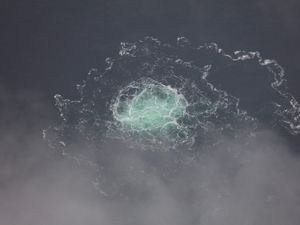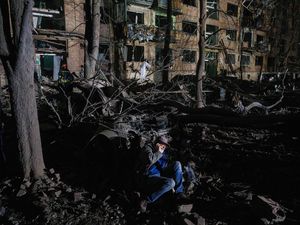Swedish navy sends special diving vessel to area of pipeline leaks
Russian President Vladimir Putin has accused the West of sabotaging Russia-built natural gas pipelines under the Baltic Sea to Germany.

Swedish official have sent a vessel capable of advanced diving missions to the Baltic Sea area where ruptured undersea pipelines had leaked natural gas for days.
Russian President Vladimir Putin has accused the West of sabotaging Russia-built natural gas pipelines under the Baltic Sea to Germany, a charge vehemently denied by the United States and its allies, who noted that Russia has been blackmailing Europe with reduced gas supplies for months.
Last week, undersea blasts damaged the Nord Stream 1 and 2 pipelines off southern Sweden and Denmark and have led to huge methane leaks, with both countries’ governments saying that several hundred pounds of explosives was involved. The emissions leaks occurred in international waters.
Swedish navy captain Jimmie Adamsson told The Associated Press that a submarine rescue ship had been sent to the site of the leaks off Sweden and is supporting the Swedish coast guard, which is in charge of the work.

It is unclear when anyone or anything would be able to go down to the pipelines, whether through the use of diving equipment or on board a submarine.
The coast guard said one of its vessels, Amfritrite, was at the site to monitor nearby sea traffic. It added that bad weather is expected, which will complicate the situation.
Over the weekend, authorities in Denmark said the Nord Stream 1 and 2 natural gas pipelines had stopped leaking.
However, the Swedish coast guard said one of its planes had reported that the smaller leak over Nord Stream 2 “has instead increased somewhat again”, was about 100ft in diameter and it may take “some time” before it stops.
The coast guard offered no explanation as to why the leak had increased. The other leak, over Nord Stream 1, has stopped, it said.
Danish authorities are monitoring the two leaks east of the Danish Baltic Sea island of Bornholm — above Nord Stream 1 and Nord Stream 2 — with the frigate Absalon, the environmental ship Gunnar Thorson, and a military helicopter.
Sweden’s prosecuting authority and the Swedish Security Services are heading an investigation, while Copenhagen police were in charge of an inquiry in Denmark.
A joint international investigation team from Denmark, Germany and Sweden, among others, was also being set up.
The UN Security Council held an emergency meeting on Friday over the pipelines attacks and Norwegian researchers published a map projecting that a huge plume of methane from the damaged pipelines will travel over large swathes of the Nordic region.
On Monday, Danish Prime Minister Mette Frederiksen noted: “Unfortunately, both a present and a future are emerging, which are more gloomy than we are used to. Authoritarian forces are gaining ground, and the international community is in turmoil.
“We got a frightening taste of it last week with the leaks on Nord Stream 1 and 2. It was surprising and worrying,” she added.
In Norway, members of a voluntary military unit, the Home Guard, were posted outside several petroleum facilities , following a request from the police, to prevent “unwanted incidents”.
The unit is to guard “critical civil and military infrastructure”.





